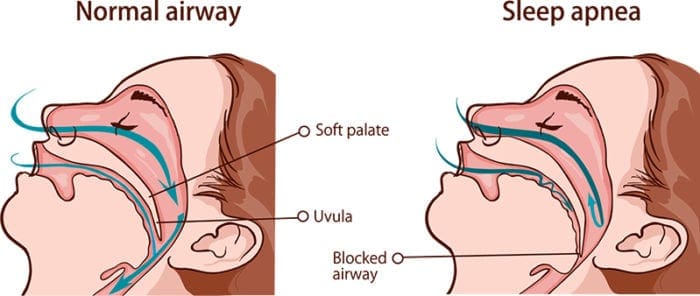Dr. James Dickert and Dr. Agatha Lynn take a comprehensive approach to your dental care, taking into consideration oral health-related concerns that can also affect your overall health and well-being. Sleep disorders, especially sleep apnea, have been diagnosed at an increasing rate and can often be treated effectively with oral appliance therapy at West Ashley Family Dentistry.
According to the American Sleep Apnea Association, around 22 million people suffer from sleep apnea. Characterized by loud snoring, sleep disorders can also lead to an increased risk for cardiovascular and systemic disease, including heart attack and stroke, and many other health complications that can impact the quality of life.
As your dentist, we have an in-depth understanding of the entire occlusal system and function of the facial structure. We can work with you on an individual basis to determine your risk factors for a sleep disorder and discuss your symptoms.
Identifying both the type of sleep disorder you may be suffering from as well as the underlying cause or risk factors is the key to providing effective care and improving your health.
Common risk factors include:
- Being overweight or obese
- Being a smoker
- Having high blood pressure
- Having a large neck circumference
- Chronic nasal congestion
- Having a narrow airway or small lower jaw
- Being male
- Being over the age of 40

Treatment for Sleep Apnea in Charleston, SC
Dr. Dickert and Dr. Lynn will work with you to determine if your symptoms are part of a sleep disorder and what type you may have. The most common type is obstructive sleep apnea (OSA).
This is typically caused by an obstruction of the upper airway during sleep resulting from the collapse of soft tissues at the back of the throat. The airway becomes blocked, and patients are momentarily unable to breathe, cutting oxygen off from vital organs. OSA can often be treated with an oral appliance to relieve symptoms and reduce associated risks.
Although the CPAP machine is still considered the “gold standard” of treatment for OSA, a custom oral appliance can be effective in mild to moderate cases. Due to the inconvenience and maintenance of the CPAP, patient compliance is generally poor, reducing its ability to improve symptoms.
An oral appliance will fit much like a custom-made sports mouthguard, allowing you to speak and drink fluids while wearing it. It works by opening the airway, relaxing the jaw muscles, and allowing you to breathe comfortably throughout the night. The device will be carefully fabricated to the specifications of your mouth.
It is comfortable, easy to use, convenient and portable. For these reasons, patients will commit to routine use and enjoy improved overall health as well as a good night’s rest.
Sleep Apnea FAQs
Can you leave sleep apnea untreated?
Leaving sleep apnea untreated should be avoided. It may increase a patient’s risk of heart issues, restless sleep, and high blood pressure. This may impact day-to-day life activities.
What should I avoid if I have sleep apnea?
Patients are told to avoid red or highly saturated fatty meat. These foods are known to increase inflammation throughout the body and can worsen the effects of sleep apnea.
What triggers sleep apnea?
Weight gain is the most common trigger for sleep apnea. It may increase the odds of an airway blockage due to increased tissue inflammation in the body.
Do I need a CPAP machine if I have sleep apnea?
Many patients with moderate to severe sleep apnea symptoms need a CPAP to sleep safely. However, not all sleep apnea patients benefit from CPAPs. Oral appliances may be enough to open the airway in patients with mild sleep apnea symptoms. Contact your doctor for sleep testing to determine if a sleep apnea appliance works for you.
Do you have sleep apnea if you snore?
You may not always have sleep apnea if you snore. However, snoring is common in patients with sleep apnea. Snoring and sleep apnea are not the same.
Snoring is the sound that occurs when air passes through relaxed tissues in the throat. Sleep apnea occurs when the tissues in the airway block breathing. You can snore when you sleep and may still not have sleep apnea.
What worsens the symptoms of sleep apnea?
Multiple factors can worsen sleep apnea:
- Sleeping on your back
- Drinking excessively
- Obesity
- High blood pressure
- Type 2 Diabetes
- Smoking
- Muscle relaxants
- Sleep aids
Schedule A Dental Exam & Sleep Apnea Evaluation Today
If you are concerned that your snoring may be a sign of a sleep disorder, schedule a visit with Dr. Dickert or Dr. Lynn. Our Charleston dentist office welcomes new patients and offers personalized care for all of your oral health needs and cosmetic goals. Contact us at (843) 371-5480 or request an appointment online.
